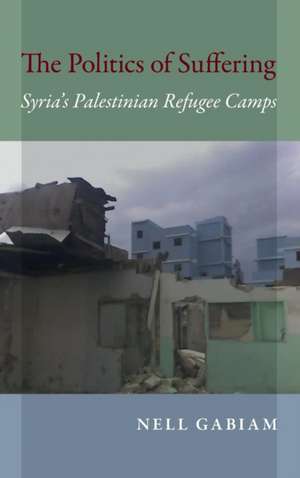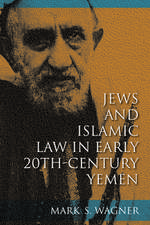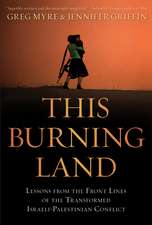The Politics of Suffering: Public Cultures of the Middle East and North Africa
Autor Nell Gabiamen Limba Engleză Hardback – 8 mai 2016
The Politics of Suffering examines the confluence of international aid, humanitarian relief, and economic development within the space of the Palestinian refugee camp. Nell Gabiam describes the interactions between UNRWA, the United Nations agency charged with providing assistance to Palestinians since the 1948 Arab-Israeli war, and residents of three camps in Syria. Over time, UNRWA's management of the camps reveals a shift from an emphasis on humanitarian aid to promotion of self-sufficiency and integration of refugees within their host society. Gabiam s analysis captures two forces in tension within the camps: politics of suffering that serves to keep alive the discourse around the Palestinian right of return; and politics of citizenship expressed through development projects that seek to close the divide between the camp and the city. Gabiam offers compelling insights into the plight of Palestinians before and during the Syrian civil war, which has led to devastation in the camps and massive displacement of their populations."
Din seria Public Cultures of the Middle East and North Africa
-
 Preț: 207.35 lei
Preț: 207.35 lei -
 Preț: 173.81 lei
Preț: 173.81 lei -
 Preț: 218.05 lei
Preț: 218.05 lei -
 Preț: 231.00 lei
Preț: 231.00 lei -
 Preț: 197.79 lei
Preț: 197.79 lei -
 Preț: 201.99 lei
Preț: 201.99 lei -
 Preț: 164.60 lei
Preț: 164.60 lei -
 Preț: 225.67 lei
Preț: 225.67 lei -
 Preț: 191.51 lei
Preț: 191.51 lei -
 Preț: 197.36 lei
Preț: 197.36 lei -
 Preț: 194.41 lei
Preț: 194.41 lei - 23%
 Preț: 446.47 lei
Preț: 446.47 lei - 23%
 Preț: 477.56 lei
Preț: 477.56 lei -
 Preț: 238.89 lei
Preț: 238.89 lei -
 Preț: 189.60 lei
Preț: 189.60 lei -
 Preț: 195.38 lei
Preț: 195.38 lei -
 Preț: 197.97 lei
Preț: 197.97 lei - 23%
 Preț: 503.30 lei
Preț: 503.30 lei -
 Preț: 199.79 lei
Preț: 199.79 lei -
 Preț: 220.10 lei
Preț: 220.10 lei - 23%
 Preț: 473.25 lei
Preț: 473.25 lei -
 Preț: 236.93 lei
Preț: 236.93 lei -
 Preț: 275.58 lei
Preț: 275.58 lei -
 Preț: 189.60 lei
Preț: 189.60 lei -
 Preț: 236.78 lei
Preț: 236.78 lei -
 Preț: 188.63 lei
Preț: 188.63 lei -
 Preț: 203.16 lei
Preț: 203.16 lei - 23%
 Preț: 445.00 lei
Preț: 445.00 lei -
 Preț: 165.56 lei
Preț: 165.56 lei -
 Preț: 238.69 lei
Preț: 238.69 lei -
 Preț: 194.41 lei
Preț: 194.41 lei
Preț: 500.33 lei
Preț vechi: 649.77 lei
-23% Nou
95.74€ • 102.38$ • 79.82£
Tipărit la comandă
Livrare economică 18 aprilie-02 mai
Specificații
ISBN-10: 0253021286
Pagini: 208
Dimensiuni: 157 x 234 x 20 mm
Greutate: 0.41 kg
Editura: Indiana University Press
Seria Public Cultures of the Middle East and North Africa
Notă biografică
Nell Gabiam is Assistant Professor of Anthropology and Political Science at Iowa State University.
Cuprins
Introduction
1. Informal Citizens: Palestinian Refugees in Syria
2. From Humanitarianism to Development: UNRWA and Palestinian Refugees
3. Sumud and Sustainability: Reinterpreting Development in Palestinian Refugee Camps
4. "Must We Live in Barracks to Convince People We Are Refugees?": The Politics of Camp Improvement
5. "A Camp Is a Feeling Inside": Urbanization and the Boundaries of Palestinian Refugee Identity
Conclusion: Beyond Suffering and Victimhood
Epilogue













